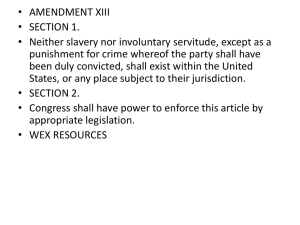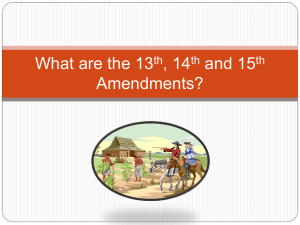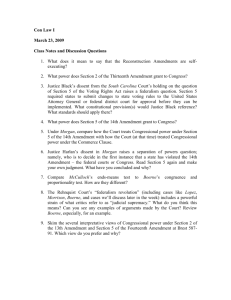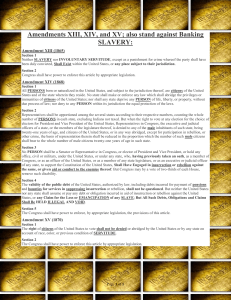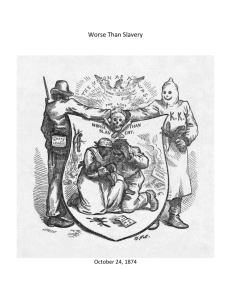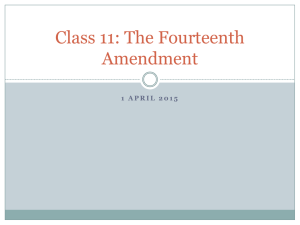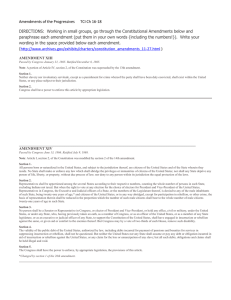14th Amendment
advertisement
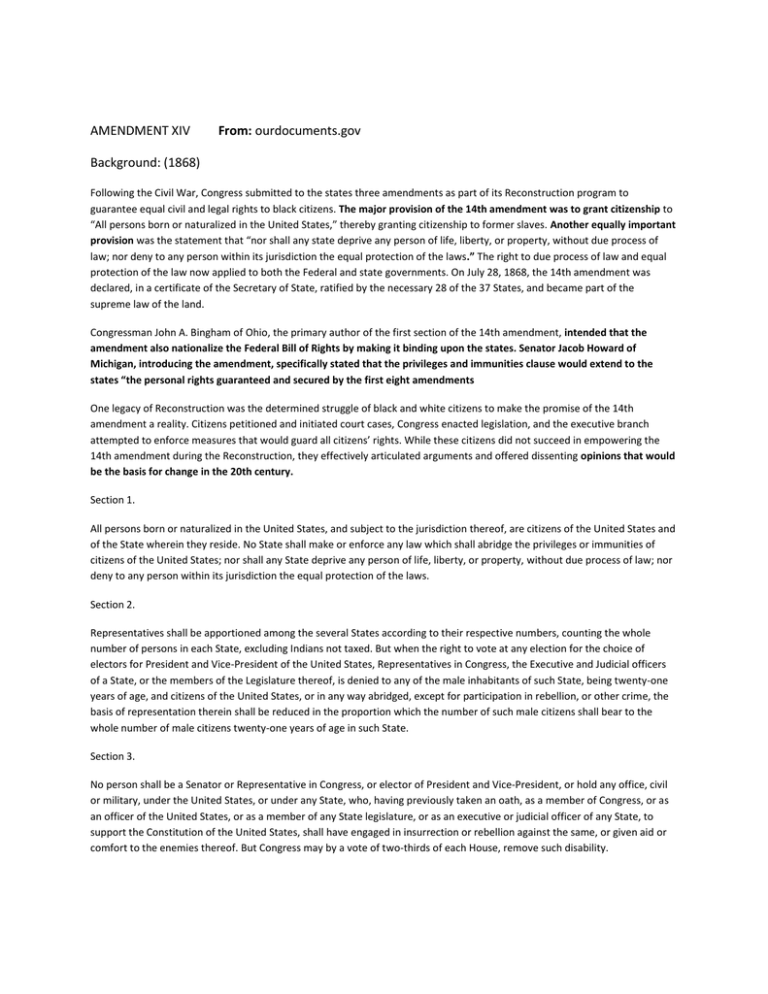
AMENDMENT XIV From: ourdocuments.gov Background: (1868) Following the Civil War, Congress submitted to the states three amendments as part of its Reconstruction program to guarantee equal civil and legal rights to black citizens. The major provision of the 14th amendment was to grant citizenship to “All persons born or naturalized in the United States,” thereby granting citizenship to former slaves. Another equally important provision was the statement that “nor shall any state deprive any person of life, liberty, or property, without due process of law; nor deny to any person within its jurisdiction the equal protection of the laws.” The right to due process of law and equal protection of the law now applied to both the Federal and state governments. On July 28, 1868, the 14th amendment was declared, in a certificate of the Secretary of State, ratified by the necessary 28 of the 37 States, and became part of the supreme law of the land. Congressman John A. Bingham of Ohio, the primary author of the first section of the 14th amendment, intended that the amendment also nationalize the Federal Bill of Rights by making it binding upon the states. Senator Jacob Howard of Michigan, introducing the amendment, specifically stated that the privileges and immunities clause would extend to the states “the personal rights guaranteed and secured by the first eight amendments One legacy of Reconstruction was the determined struggle of black and white citizens to make the promise of the 14th amendment a reality. Citizens petitioned and initiated court cases, Congress enacted legislation, and the executive branch attempted to enforce measures that would guard all citizens’ rights. While these citizens did not succeed in empowering the 14th amendment during the Reconstruction, they effectively articulated arguments and offered dissenting opinions that would be the basis for change in the 20th century. Section 1. All persons born or naturalized in the United States, and subject to the jurisdiction thereof, are citizens of the United States and of the State wherein they reside. No State shall make or enforce any law which shall abridge the privileges or immunities of citizens of the United States; nor shall any State deprive any person of life, liberty, or property, without due process of law; nor deny to any person within its jurisdiction the equal protection of the laws. Section 2. Representatives shall be apportioned among the several States according to their respective numbers, counting the whole number of persons in each State, excluding Indians not taxed. But when the right to vote at any election for the choice of electors for President and Vice-President of the United States, Representatives in Congress, the Executive and Judicial officers of a State, or the members of the Legislature thereof, is denied to any of the male inhabitants of such State, being twenty-one years of age, and citizens of the United States, or in any way abridged, except for participation in rebellion, or other crime, the basis of representation therein shall be reduced in the proportion which the number of such male citizens shall bear to the whole number of male citizens twenty-one years of age in such State. Section 3. No person shall be a Senator or Representative in Congress, or elector of President and Vice-President, or hold any office, civil or military, under the United States, or under any State, who, having previously taken an oath, as a member of Congress, or as an officer of the United States, or as a member of any State legislature, or as an executive or judicial officer of any State, to support the Constitution of the United States, shall have engaged in insurrection or rebellion against the same, or given aid or comfort to the enemies thereof. But Congress may by a vote of two-thirds of each House, remove such disability. Section 4. The validity of the public debt of the United States, authorized by law, including debts incurred for payment of pensions and bounties for services in suppressing insurrection or rebellion, shall not be questioned. But neither the United States nor any State shall assume or pay any debt or obligation incurred in aid of insurrection or rebellion against the United States, or any claim for the loss or emancipation of any slave; but all such debts, obligations and claims shall be held illegal and void. Section 5. The Congress shall have the power to enforce, by appropriate legislation, the provisions of this article. QUESTIONS: 1. 2. 3. 4. Which Supreme Court case (1857) does this amendment “overturn” ? What is the significance of “equal protection?” This is the only place in the constitution where gender is specifically referred to…In what context is “Male” used? What restrictions are placed upon “traitors” who violated their previous oath of office to uphold the Constitution? Who, what, When, Where, Why? What do you notice? (2)

